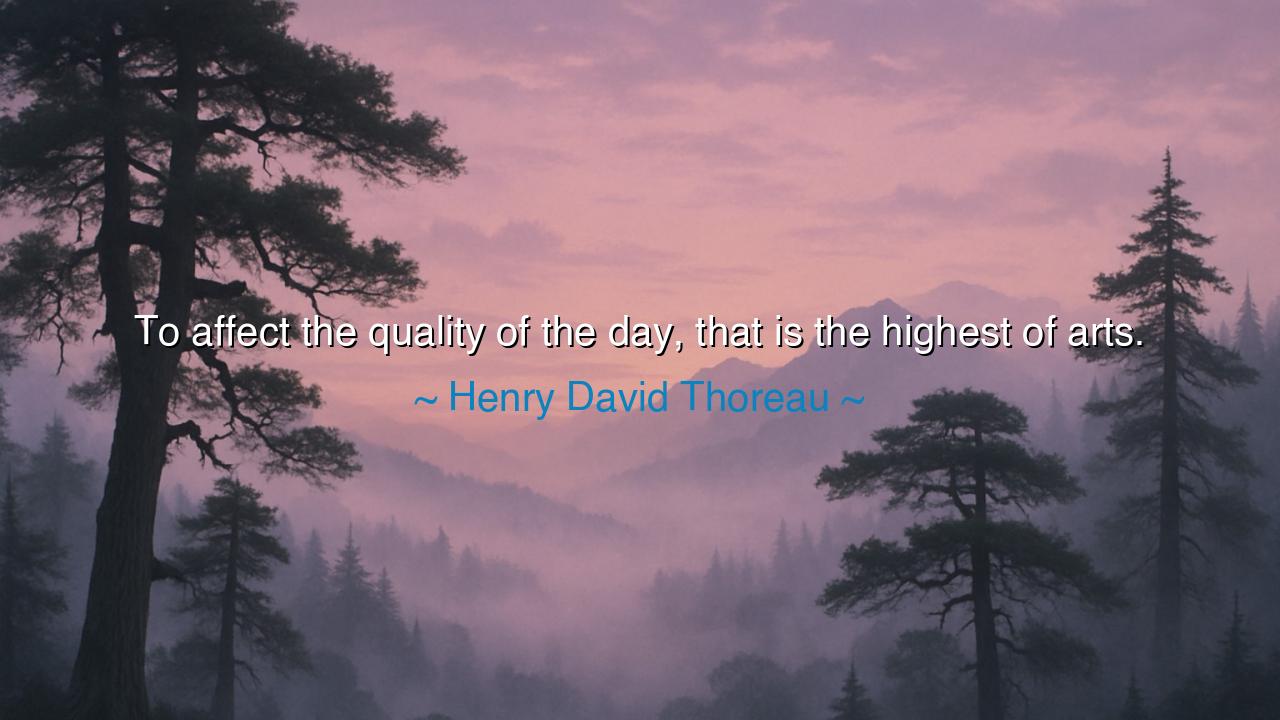
To affect the quality of the day, that is the highest of arts.






“To affect the quality of the day, that is the highest of arts.” Thus wrote Henry David Thoreau, the philosopher of Walden Pond, whose heart beat in harmony with nature and whose words still echo like wind through the leaves of time. In this single line, he offers a truth as profound as it is simple — that the greatest masterpiece one can create is not a painting, nor a poem, nor a song, but a day well-lived. To shape the day — to lift its tone, brighten its mood, infuse it with meaning — is the noblest art, for it transforms not only the artist’s own soul, but the world around him.
Thoreau wrote these words in Walden, his reflection on a life lived deliberately, away from the noise and haste of society. He sought to rediscover the essence of existence, to learn what it means to truly live rather than merely to survive. In his solitude beside the still waters, he discovered that life itself is art, and that each moment is a canvas upon which the human spirit paints. To “affect the quality of the day” means to live with intention — to infuse one’s hours with beauty, thought, and purpose. The highest artist, therefore, is not only the poet or sculptor, but the soul who wakes each morning resolved to make that day better — richer in kindness, deeper in gratitude, clearer in joy.
What Thoreau suggests is both empowering and humbling: that every person, no matter how modest their circumstance, holds within them the power to shape the quality of their day. It is not wealth, nor fame, nor circumstance that gives life its color, but consciousness — the way we choose to see, to act, to love. A poor man who greets the dawn with a smile and offers a word of comfort to a stranger has created a work of art as noble as any symphony. The essence of this art lies not in the grand, but in the graceful — in the quiet courage to meet each moment with presence and goodwill.
Consider the example of Mahatma Gandhi, who turned even the smallest acts — spinning cloth, fasting, walking barefoot across his land — into expressions of moral beauty. Each of his days was shaped by intention: simplicity, truth, and compassion. His life became an art form, not painted on canvas, but woven into the fabric of his people’s awakening. Gandhi did not wait for greatness to come; he made greatness out of the ordinary. His every sunrise was a chance to “affect the quality of the day,” to infuse it with meaning and service. In this way, his art became immortal — the art of living well, for the sake of others.
The ancients, too, understood this wisdom. The Stoic philosopher Marcus Aurelius wrote that each day presents a new opportunity to live in accordance with virtue, to greet whatever comes with calm and dignity. “Waste no more time,” he said, “arguing about what a good man should be. Be one.” To affect the quality of the day, therefore, is not to control events, but to control the spirit with which one meets them. The storms of life may rage, but the artist of the soul paints serenity within the tempest. To live thus is to master the hardest of all arts — the art of the heart.
Yet Thoreau’s words also bear a challenge: to recognize that every choice we make ripples outward, shaping the day not only for ourselves but for others. A harsh word darkens the world; a kind one brightens it. A small act of goodness may lift another soul from despair. To live consciously is to understand that we are each, in our own way, artists of the collective dawn — co-creators of the world’s light or its shadow. The truest art, then, is not self-expression alone, but the elevation of life itself, for oneself and for others.
So, my child, let this truth settle deep within you: every morning is a blank page, every hour a brushstroke, every deed a color. You need not be a painter or a poet to practice Thoreau’s art — only awake, and willing to live with care. Begin the day with gratitude; speak with gentleness; walk with awareness; end with peace. Let no day pass unadorned by kindness or wonder. For in doing so, you become what Thoreau called the highest artist — one who shapes not marble, but moments; not portraits, but lives.
And when your days are done, and time gathers them as autumn gathers leaves, may the pattern of your life reveal its beauty — not in what you possessed, but in the quality of the days you touched. For the greatest legacy is not wealth or fame, but the quiet grace of a soul that affected the quality of each day, and in so doing, taught others the highest of arts: the art of living beautifully.






AAdministratorAdministrator
Welcome, honored guests. Please leave a comment, we will respond soon